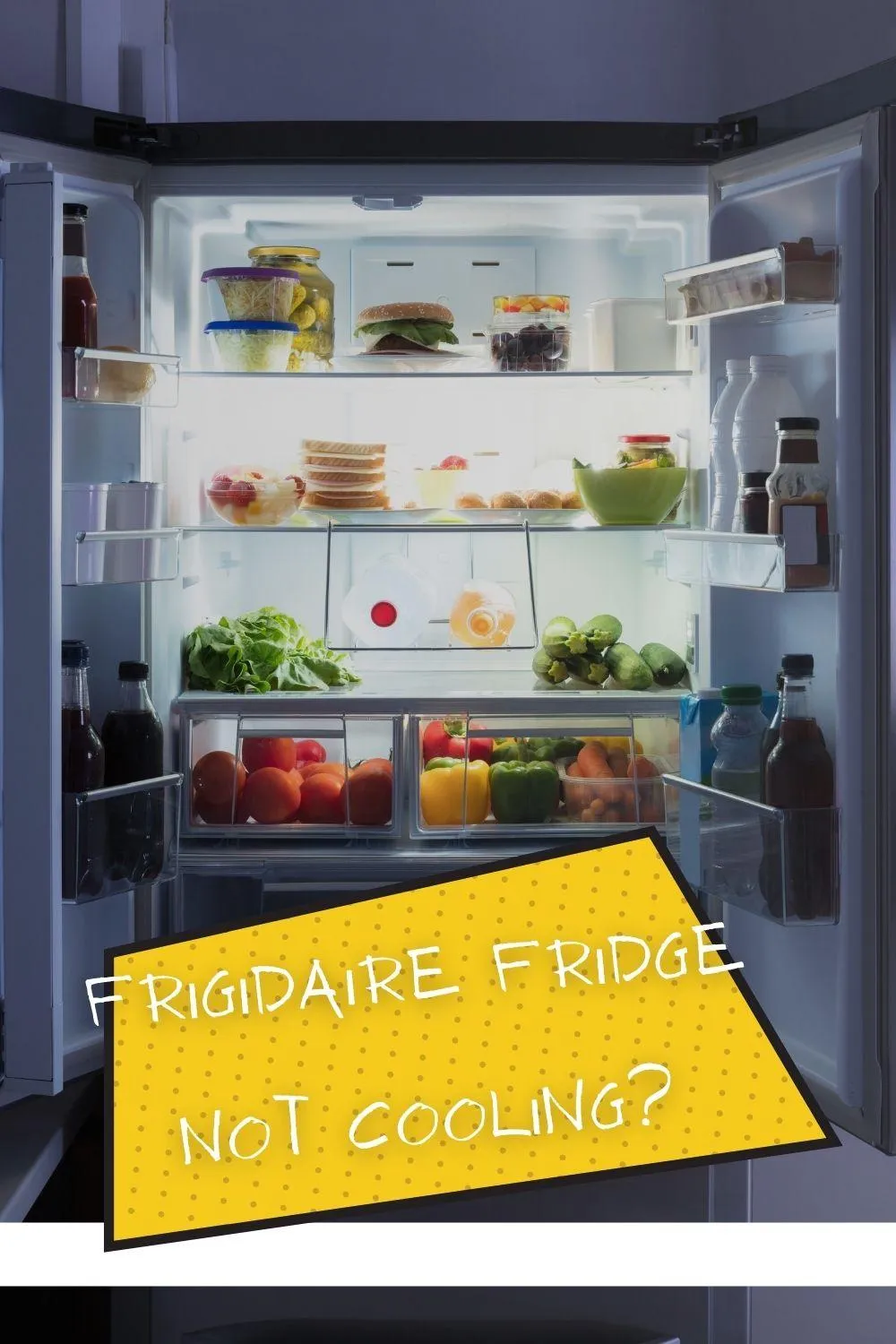THE FASTEST TOOLS IN TOWN
ZIP APPLIANCE REPAIR & SERVICE
Phone: (559) 272-4265
Phone: (559) 272-4265
Appliance Repair Tips For Fresno, CA Residents

Chill Out: Frigidaire Fridge Not Cooling? Here's What to Do
"Stay cool under pressure with our guide to fixing a Frigidaire fridge that's lost its chill. From troubleshooting tips to expert advice, we've got you covered when it comes to keeping your kitchen cool and your food fresh." - Appliance Boss
Introduction:
A well-functioning fridge is the unsung hero of every household, quietly humming in the background, diligently preserving our food and beverages. It's not just a convenience; it's a necessity for modern living. Think about it: where else can you store your milk, cheese, fruits, and vegetables, keeping them fresh and ready to enjoy at a moment's notice? Without a properly functioning fridge, our food would spoil faster, leading to more frequent grocery trips and increased food waste.

The Dreaded Issue: Frigidaire Fridge Not Cooling
Despite its importance, a fridge that's not cooling properly can quickly turn from a helpful appliance to a frustrating headache. Picture this: you open your fridge door, expecting to feel the rush of cool air, only to be greeted by lukewarm temperatures. Panic sets in as you realize that your perishables are at risk of spoiling. It's a scenario that no homeowner wants to face, yet it's one that many encounter at some point.
Why It Happens: Common Causes of Cooling Problems
Understanding why your Frigidaire fridge isn't cooling adequately is the first step toward finding a solution. There are several potential culprits, ranging from simple issues like power supply problems to more complex issues involving components like the condenser coils, door seals, and compressor. By familiarizing yourself with these common causes, you'll be better equipped to troubleshoot and resolve cooling issues as they arise.
Understanding the Basics
How Does a Fridge Work?
At its core, a fridge operates on the principle of heat transfer. It removes heat from the interior compartment and releases it into the surrounding environment, keeping the inside cool and your food fresh. This process relies on the circulation of refrigerant through a closed system of coils, where it undergoes compression, condensation, expansion, and evaporation to achieve the desired temperature.
Importance of Proper Cooling in Food Preservation
Proper cooling isn't just about keeping your drinks cold; it's about preserving the safety and quality of your food. By maintaining a consistent and optimal temperature range, your fridge slows down the growth of bacteria and other microorganisms that can cause foodborne illnesses. This helps to extend the shelf life of your groceries and reduce the risk of food spoilage.
Signs Your Frigidaire Fridge Isn't Cooling Adequately
Recognizing the signs of inadequate cooling is crucial for addressing potential problems early on. Keep an eye out for warning signs like warm temperatures inside the fridge, excessive frost buildup in the freezer, unusual noises emanating from the appliance, and food that spoils prematurely. If you notice any of these red flags, it's important to take action promptly to prevent further issues.
Troubleshooting Steps
Step 1: Check the Power Supply
Ensuring Proper Power Connection
The first step in troubleshooting a cooling issue is to verify that your fridge is receiving power. Check that it's properly plugged into a functioning outlet and that the circuit breaker hasn't tripped. If you're experiencing power outages or fluctuations, consider installing a voltage stabilizer or surge protector to safeguard your appliance against electrical disturbances.
Addressing Power Outages or Fluctuations
Power outages or fluctuations can disrupt the cooling process in your fridge, leading to temperature fluctuations and potential damage to perishable items. If you suspect that power issues are affecting your fridge's performance, consider investing in a backup power supply or generator to ensure consistent power delivery during emergencies.
Step 2: Temperature Settings Check
Correct Temperature Settings for Optimal Cooling
Your fridge's temperature settings play a crucial role in maintaining optimal cooling performance. Refer to the manufacturer's guidelines to determine the recommended temperature range for your specific model. In general, the ideal temperature for most fridges is between 37°F and 40°F (3°C and 4°C), while the freezer should be set between 0°F and 5°F (-18°C and -15°C).
Adjusting the Thermostat Settings
If you find that your fridge isn't cooling adequately, double-check the thermostat settings to ensure they're correctly adjusted. Keep in mind that factors like ambient temperature, frequency of door openings, and the amount of food stored inside can affect your fridge's cooling efficiency. Experiment with different settings to find the optimal balance between cooling performance and energy efficiency.
Step 3: Clean the Condenser Coils
Importance of Clean Coils for Efficient Cooling
The condenser coils play a crucial role in dissipating heat from your fridge's interior compartment, allowing it to maintain a cool temperature. Over time, these coils can become coated with dust, dirt, and other debris, hindering their ability to dissipate heat efficiently. This can lead to reduced cooling performance and increased energy consumption.
How to Safely Clean Frigidaire Fridge Coils
To clean the condenser coils, start by unplugging your fridge and locating the coils, which are typically located on the back or bottom of the appliance. Use a soft brush or vacuum cleaner with a brush attachment to gently remove any accumulated debris from the coils. Be careful not to bend or damage the coils during cleaning, as this can impair their functionality.
Step 4: Assessing the Door Seal
Importance of a Properly Sealed Door for Cooling Efficiency
The door seal, also known as the gasket, plays a crucial role in maintaining the integrity of your fridge's interior compartment. It creates an airtight seal when the door is closed, preventing warm air from entering and cold air from escaping. If the door seal is damaged or worn out, it can compromise your fridge's cooling efficiency and lead to temperature fluctuations.
Tips for Checking and Replacing Faulty Seals
To check the condition of your fridge's door seal, perform a visual inspection for signs of wear, tear, or damage. Look for cracks, tears, or gaps in the seal that could indicate a problem. You can also perform a simple dollar bill test by closing the door on a dollar bill and trying to pull it out. If the bill slides out easily or if you notice gaps between the seal and the door frame, it may be time to replace the seal.
Step 5: Clearing Air Vents and Fans
Understanding the Role of Vents and Fans in Cooling
Air vents and fans play a crucial role in circulating cold air throughout your fridge's interior compartment, ensuring uniform cooling and temperature distribution. If these vents or fans become blocked or obstructed, it can impede the flow of cold air and lead to uneven cooling or temperature fluctuations.
How to Clean and Maintain Air Vents and Fans
To maintain optimal airflow in your fridge, periodically check the air vents and fans for signs of dust, debris, or obstructions. Use a soft brush or cloth to gently remove any accumulated dirt or debris from the vents and fan blades. Be careful not to damage the delicate components during cleaning, and avoid using sharp objects or abrasive materials that could cause scratches or damage.
Advanced Troubleshooting
Step 6: Defrosting the Freezer
When and How to Defrost a Frigidaire Freezer
Over time, frost can accumulate on the walls and shelves of your freezer, reducing its efficiency and impeding airflow. If you notice excessive frost buildup in your freezer, it may be time to defrost it. To defrost a Frigidaire freezer, start by removing all food items and placing them in a cooler or insulated container to keep them
Conclusion
In conclusion, the proper functioning of your Frigidaire fridge is paramount for preserving the freshness and safety of your food items. A well-maintained fridge not only ensures that your groceries stay cool and crisp but also minimizes the risk of foodborne illnesses and unnecessary expenses due to spoilage. By understanding the basics of fridge operation, recognizing common signs of cooling problems, and following the troubleshooting steps outlined in this guide, you can effectively address cooling issues and restore your fridge to optimal performance.
At Zip Appliance Repair and Service, we understand the importance of prompt and reliable appliance repairs. If you encounter cooling issues with your Frigidaire fridge that require professional attention, don't hesitate to contact us. Our team of experienced technicians is here to help diagnose and resolve any fridge-related problems you may encounter. Visit our website at fresno.ziprepairservice.com or give us a call at (559) 272-4265 to schedule a service appointment today. Enjoy peace of mind knowing that your fridge is in good hands with Zip Appliance Repair and Service.

Chill Out: Frigidaire Fridge Not Cooling? Here's What to Do
"Stay cool under pressure with our guide to fixing a Frigidaire fridge that's lost its chill. From troubleshooting tips to expert advice, we've got you covered when it comes to keeping your kitchen cool and your food fresh." - Appliance Boss
Introduction:
A well-functioning fridge is the unsung hero of every household, quietly humming in the background, diligently preserving our food and beverages. It's not just a convenience; it's a necessity for modern living. Think about it: where else can you store your milk, cheese, fruits, and vegetables, keeping them fresh and ready to enjoy at a moment's notice? Without a properly functioning fridge, our food would spoil faster, leading to more frequent grocery trips and increased food waste.

The Dreaded Issue: Frigidaire Fridge Not Cooling
Despite its importance, a fridge that's not cooling properly can quickly turn from a helpful appliance to a frustrating headache. Picture this: you open your fridge door, expecting to feel the rush of cool air, only to be greeted by lukewarm temperatures. Panic sets in as you realize that your perishables are at risk of spoiling. It's a scenario that no homeowner wants to face, yet it's one that many encounter at some point.
Why It Happens: Common Causes of Cooling Problems
Understanding why your Frigidaire fridge isn't cooling adequately is the first step toward finding a solution. There are several potential culprits, ranging from simple issues like power supply problems to more complex issues involving components like the condenser coils, door seals, and compressor. By familiarizing yourself with these common causes, you'll be better equipped to troubleshoot and resolve cooling issues as they arise.
Understanding the Basics
How Does a Fridge Work?
At its core, a fridge operates on the principle of heat transfer. It removes heat from the interior compartment and releases it into the surrounding environment, keeping the inside cool and your food fresh. This process relies on the circulation of refrigerant through a closed system of coils, where it undergoes compression, condensation, expansion, and evaporation to achieve the desired temperature.
Importance of Proper Cooling in Food Preservation
Proper cooling isn't just about keeping your drinks cold; it's about preserving the safety and quality of your food. By maintaining a consistent and optimal temperature range, your fridge slows down the growth of bacteria and other microorganisms that can cause foodborne illnesses. This helps to extend the shelf life of your groceries and reduce the risk of food spoilage.
Signs Your Frigidaire Fridge Isn't Cooling Adequately
Recognizing the signs of inadequate cooling is crucial for addressing potential problems early on. Keep an eye out for warning signs like warm temperatures inside the fridge, excessive frost buildup in the freezer, unusual noises emanating from the appliance, and food that spoils prematurely. If you notice any of these red flags, it's important to take action promptly to prevent further issues.
Troubleshooting Steps
Step 1: Check the Power Supply
Ensuring Proper Power Connection
The first step in troubleshooting a cooling issue is to verify that your fridge is receiving power. Check that it's properly plugged into a functioning outlet and that the circuit breaker hasn't tripped. If you're experiencing power outages or fluctuations, consider installing a voltage stabilizer or surge protector to safeguard your appliance against electrical disturbances.
Addressing Power Outages or Fluctuations
Power outages or fluctuations can disrupt the cooling process in your fridge, leading to temperature fluctuations and potential damage to perishable items. If you suspect that power issues are affecting your fridge's performance, consider investing in a backup power supply or generator to ensure consistent power delivery during emergencies.
Step 2: Temperature Settings Check
Correct Temperature Settings for Optimal Cooling
Your fridge's temperature settings play a crucial role in maintaining optimal cooling performance. Refer to the manufacturer's guidelines to determine the recommended temperature range for your specific model. In general, the ideal temperature for most fridges is between 37°F and 40°F (3°C and 4°C), while the freezer should be set between 0°F and 5°F (-18°C and -15°C).
Adjusting the Thermostat Settings
If you find that your fridge isn't cooling adequately, double-check the thermostat settings to ensure they're correctly adjusted. Keep in mind that factors like ambient temperature, frequency of door openings, and the amount of food stored inside can affect your fridge's cooling efficiency. Experiment with different settings to find the optimal balance between cooling performance and energy efficiency.
Step 3: Clean the Condenser Coils
Importance of Clean Coils for Efficient Cooling
The condenser coils play a crucial role in dissipating heat from your fridge's interior compartment, allowing it to maintain a cool temperature. Over time, these coils can become coated with dust, dirt, and other debris, hindering their ability to dissipate heat efficiently. This can lead to reduced cooling performance and increased energy consumption.
How to Safely Clean Frigidaire Fridge Coils
To clean the condenser coils, start by unplugging your fridge and locating the coils, which are typically located on the back or bottom of the appliance. Use a soft brush or vacuum cleaner with a brush attachment to gently remove any accumulated debris from the coils. Be careful not to bend or damage the coils during cleaning, as this can impair their functionality.
Step 4: Assessing the Door Seal
Importance of a Properly Sealed Door for Cooling Efficiency
The door seal, also known as the gasket, plays a crucial role in maintaining the integrity of your fridge's interior compartment. It creates an airtight seal when the door is closed, preventing warm air from entering and cold air from escaping. If the door seal is damaged or worn out, it can compromise your fridge's cooling efficiency and lead to temperature fluctuations.
Tips for Checking and Replacing Faulty Seals
To check the condition of your fridge's door seal, perform a visual inspection for signs of wear, tear, or damage. Look for cracks, tears, or gaps in the seal that could indicate a problem. You can also perform a simple dollar bill test by closing the door on a dollar bill and trying to pull it out. If the bill slides out easily or if you notice gaps between the seal and the door frame, it may be time to replace the seal.
Step 5: Clearing Air Vents and Fans
Understanding the Role of Vents and Fans in Cooling
Air vents and fans play a crucial role in circulating cold air throughout your fridge's interior compartment, ensuring uniform cooling and temperature distribution. If these vents or fans become blocked or obstructed, it can impede the flow of cold air and lead to uneven cooling or temperature fluctuations.
How to Clean and Maintain Air Vents and Fans
To maintain optimal airflow in your fridge, periodically check the air vents and fans for signs of dust, debris, or obstructions. Use a soft brush or cloth to gently remove any accumulated dirt or debris from the vents and fan blades. Be careful not to damage the delicate components during cleaning, and avoid using sharp objects or abrasive materials that could cause scratches or damage.
Advanced Troubleshooting
Step 6: Defrosting the Freezer
When and How to Defrost a Frigidaire Freezer
Over time, frost can accumulate on the walls and shelves of your freezer, reducing its efficiency and impeding airflow. If you notice excessive frost buildup in your freezer, it may be time to defrost it. To defrost a Frigidaire freezer, start by removing all food items and placing them in a cooler or insulated container to keep them
Conclusion
In conclusion, the proper functioning of your Frigidaire fridge is paramount for preserving the freshness and safety of your food items. A well-maintained fridge not only ensures that your groceries stay cool and crisp but also minimizes the risk of foodborne illnesses and unnecessary expenses due to spoilage. By understanding the basics of fridge operation, recognizing common signs of cooling problems, and following the troubleshooting steps outlined in this guide, you can effectively address cooling issues and restore your fridge to optimal performance.
At Zip Appliance Repair and Service, we understand the importance of prompt and reliable appliance repairs. If you encounter cooling issues with your Frigidaire fridge that require professional attention, don't hesitate to contact us. Our team of experienced technicians is here to help diagnose and resolve any fridge-related problems you may encounter. Visit our website at fresno.ziprepairservice.com or give us a call at (559) 272-4265 to schedule a service appointment today. Enjoy peace of mind knowing that your fridge is in good hands with Zip Appliance Repair and Service.
If your dryer has been giving you problems, contact Zip Appliance Repair & Service at (559) 272-4265

Appliance Repair In A Zip
If you need a dryer repair call our Team at (559) 272-4265, or visit our online scheduling page to request service.
Appliance Repair
HAVE A QUESTION, CALL (559) 272-4265

Online Offers
Take advantage of our online discount offers - save time and money...

Residential & Commercial appliances
See what our company can do for you

Appliance Repair Tips
If your appliance is not working properly...

1405 Commercial Way ste 100
Bakersfield, CA 93309
Lic # 1116346
Equipment We Sevice
- A Call To Confirm Your Appointment Time
- A Email Detailing Your Assigned Technician
- Information Needed Before The Repair Can Be Started
- An Estimate Of Work To Be Done
© 2025 ZIP APPLIANCE REPAIR & SERVICE LLC







